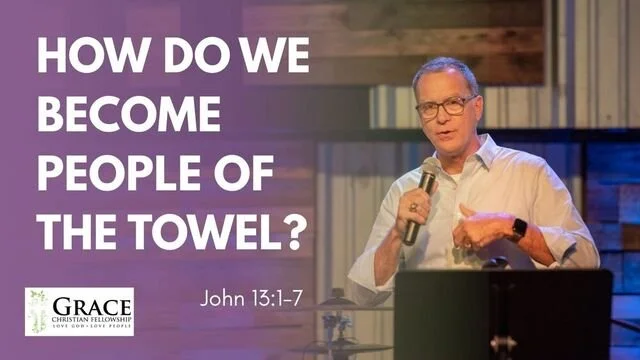How Will You Respond to Jesus' Miracles? What Will You Do With What You've Seen? | John 11:45-57 | Chris Karpus
Description
How will you Respond to Jesus’ Miracles? What will you do with what you’ve seen?
John 11:45-57
Takes place Right after Jesus raised Lazarus from the dead
Everything from this point forward in the Gospel of John focuses on the cross.
The raising of Lazarus from the dead assures us of Jesus’ power over death before He even goes to the
cross to die.
John 11:45-57 NIV
The Plot to Kill Jesus
45 Therefore many of the Jews who had come to visit Mary, and had seen what Jesus did, believed in
him. 46 But some of them went to the Pharisees and told them what Jesus had done. 47 Then the chief
priests and the Pharisees called a meeting of the Sanhedrin.
“What are we accomplishing?” they asked. “Here is this man performing many signs. 48 If we let him go
on like this, everyone will believe in him, and then the Romans will come and take away both our temple
and our nation.”
49 Then one of them, named Caiaphas, who was high priest that year, spoke up, “You know nothing at
all! 50 You do not realize that it is better for you that one man die for the people than that the whole
nation perish.”
51 He did not say this on his own, but as high priest that year he prophesied that Jesus would die for the
Jewish nation, 52 and not only for that nation but also for the scattered children of God, to bring them
together and make them one. 53 So from that day on they plotted to take his life.
54 Therefore Jesus no longer moved about publicly among the people of Judea. Instead he withdrew to a
region near the wilderness, to a village called Ephraim, where he stayed with his disciples.
55 When it was almost time for the Jewish Passover, many went up from the country to Jerusalem for
their ceremonial cleansing before the Passover. 56 They kept looking for Jesus, and as they stood in the
temple courts they asked one another, “What do you think? Isn’t he coming to the festival at all?” 57 But
the chief priests and the Pharisees had given orders that anyone who found out where Jesus was should
report it so that they might arrest him.
- There were 2 reactions from those who witnessed Jesus raising Lazarus from the dead
o 45 Therefore many of the Jews who had come to visit Mary, and had seen what Jesus
did, believed in him.
Who else but God can raise a man who had been in the tomb for 4 days?
- 46 But some of them went to the Pharisees and told them what Jesus had done.
o It’s amazing that 2 groups of people can witness the same event and come away with
completely different reactions
The way people see miracles depends on their moral condition
Somehow, it isn’t a guarantee that someone will come to Christ just because they
witness a miracle
If a person is filled with unbelief, it might not make a difference if they’ve seen a
miracle
Rather than worship Jesus in reverence for what they saw, they had to report it
Jesus becomes Israel’s most wanted for the crime of raising a man from the dead. He
restored Lazarus’ life, but many Jews want to take Jesus’ life. Pretty ironic, right?
47 Then the chief priests and the Pharisees called a meeting of the Sanhedrin.
- The Sanhedrin was the highest judicial body in Israel
o They had the political and spiritual power, but served under Roman authority
o In their point of view this was devastating
o Any time the star witness is a resurrected corpse – you have a pretty good case for the
validity of Jesus as the Messiah.
47 Continued “What are we accomplishing?” they asked. “Here is this man performing many
signs. 48 If we let him go on like this, everyone will believe in him, and then the Romans will
come and take away both our temple and our nation.”
- Jesus’ enemies admit that He is doing miraculous works (many signs)
o They didn’t protest the authenticity of the healings
o Too many miracles to deny the reality of the works
- We see this later, when some of the disciples were performing miracles in Jesus name, and were
brought before the Sanhedrin…
- Acts 4:15-17
- 15 So they ordered them to withdraw from the Sanhedrin and then conferred together. 16 “What are
we going to do with these men?” they asked. “Everyone living in Jerusalem knows they have
performed a notable sign, and we cannot deny it. 17 But to stop this thing from spreading any further
among the people, we must warn them to speak no longer to anyone in this name.”
o “Don’t confuse me with the facts – I’ve made up my mind”
o How do we explain their failure to see the truth?
It wasn’t lack of information
Jesus actually gave the answer back in Chapter 9 when He told them they were
blinded by their sin.
All of this religion and all of this biblical knowledge represented by the Sanhedrin,
yet they were unable to see the glory of God’s Son – because of sin.
Some of the things we can take away from the Sanhedrin…
You can be religious, but lost.
You can memorize scripture but still be ignorant of its truth.
You can say all the right things, but still have a heart that hasn’t been transformed
by the power of Jesus Christ.
o They also had questioned the source of the miracles: demonic in origin
- Matthew 9:34
34 But the Pharisees said, “It is by the prince of demons that he drives out demons.”
- They were just trying to justify their position
o And so we see their unbelief play out in an interesting way that even applies to us today
too: unbelief will encourage you to protect your idols (vv. 45-48).
- 1. Unbelief encourages you to protect your idols
48 If we let him go on like this, everyone will believe in him, and then the Romans will come and
take away both our temple and our nation.”
Their primary concern was maintaining control – Jesus threatened their position and influence –
their idols
o They are afraid that the Romans will come in and take away their nation
Their concern wasn’t for the people, but for themselves
They believe that if people worship Jesus as the Messiah, then the Jews will come
<p class="" style="white-sp























